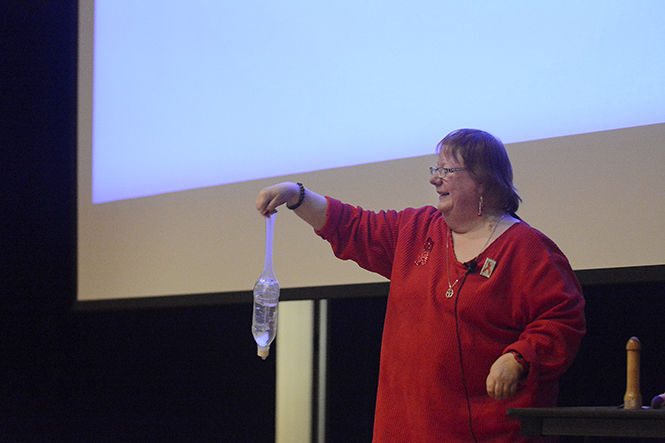Speakers educate students about HIV/AIDS prevention
Kat Holtz, HIV specialist for the Portage County Health Department, demonstrates how large a small-sized condom is during her presentation about AIDS prevention and the United Nations vision of “Getting to Zero” with HIV on Dec. 1, 2014. Holtz said that if a guy ever claims his penis is too big for a condom, he should see this demonstration.
Health officials joined together Dec. 1 to educate students on HIV/AIDS awareness and prevention in honor of World AIDS Day.
The presentation featured two keynote speakers addressing the “Getting to Zero” issue, which aims to reduce the number of newly infected patients to zero per year.
Dianne Kerr, associate professor for health education and promotion, discussed statistics and ways individuals can help in the effort to stop the spread of AIDS and HIV.
“This virus doesn’t discriminate,” Kerr said. She mentioned some people are more likely to contract AIDS, including adolescent women, men who engage in sexual activity with other men and transgender individuals.
Kerr said that 3.5 million people live with HIV today, and 2.1 million were infected last year. Countries in the sub-Saharan African region are leading nations for the number of individuals with HIV and AIDS.
Though other countries have more AIDS cases, the United States has a number of individuals combating AIDS as well.
“We think that the epidemic is over because we’re not seeing it as much,” Kerr said.
She said that though medications are able to improve symptoms and conditions, 50,000 people still become infected every year in the U.S.
“If we work together as a global community, we can do much to defeat this epidemic,” Kerr said. “We’re making good progress globally. There’s still so much we can do.”
Researchers discovered more than 30 drugs to help improve symptoms of AIDS and HIV. These medications can expand the lifespan of someone with AIDS to one of someone without AIDS or HIV.
Some medications, such as TRUVADA, work to prevent contracting HIV or AIDS for those who are more at risk for getting this disease. Microbicide development has also been underway to kill HIV on contact, Kerr said.
“One of the best ways worldwide to combat HIV” is through educating women, Kerr said. Organizations such as Oprah Winfrey’s Leadership Academy dedicate their time to educating women.
Educating those who are at risk for HIV/AIDS and getting tested for these viruses play an important role in preventing further spread and infection of these viruses.
“AIDS is not over,” Kerr said. “It could be over, I think, if we all could take action.”
After Kerr’s presentation, Kat Holtz, health educator and HIV specialist at Portage County Health Department, followed with a demonstration on practicing safe sex.
Safe sex can prevent the spread of sexually transmitted infections through proper use of latex condoms and proper precautions during oral sex.
Holtz said many people misuse condoms, which make it easier for them to break during intercourse.
“It’s important to take the step of protecting yourself. Nobody else can protect you but you,” Holtz said.
If a person does not properly put on a condom, it can fall off or break during intercourse, which can make both partners at risk for sexually transmitted infections.
The proper way to put on a condom includes pinching the tip of the condom, something Holtz said many forget to do, to keep out air bubbles as the condom is rolled on. If air bubbles are in the condom once it is on, it will be easier to break during intercourse.
How couples store their condoms affects the protection the condom supplies as well, she said.
Keeping a condom in a wallet can put pressure on it, which can cause it to break. Keeping condoms in a car can also weaken the condom due to extreme cold or hot weather exposure.
“If it looks bad, don’t trust it,” Holtz said.
Using proper lubricant can prevent breakage as well. Water-based lubricants work best while oil or Vaseline products can weaken the condom, putting the couple at risk for transmitting disease.
Using condoms, whether male or female, plays an important role in preventing the transmission of HIV/AIDS and other sexually transmitted infectious diseases. Sexually transmitted infections can be contracted through any form of contact with bodily fluids.
The event concluded with a list of ways individuals can personally help in the effort to stop the spread of HIV/AIDS. Some of these ways include donating to organizations aimed at fighting poverty, sponsoring an orphan with HIV/AIDS, practicing safe sex and educating friends and family.
“One person can make a difference in HIV prevention,” Kerr said.
Other events for World AIDS Day will continue throughout the week, including outreach resource tables, free confidential HIV testing, a brown bag luncheon and a presentation on The History of HIV: When, Who, How by Joshua L. Morgan, risk reduction and outreach coordinator.
Contact Samantha Ickes at [email protected].



